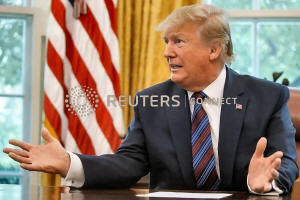Flaws seen in Trump's calm response to North Korean missile launches
 Send a link to a friend
Send a link to a friend
 [July 27, 2019]
By David Brunnstrom and Steve Holland [July 27, 2019]
By David Brunnstrom and Steve Holland
WASHINGTON (Reuters) - U.S. President
Donald Trump on Friday played down North Korea's latest launch of
short-range ballistic missiles, calling them "very standard," a response
some analysts said exposed flaws in his approach to Pyongyang and
ignored the threat posed to allies Japan and South Korea as well as the
U.S. troops they host.
North Korea said Thursday's launches were a warning to South Korean
"warmongers" to stop importing weapons and conducting joint military
drills, a message that analysts said was also aimed at the United
States.
The launches were the first North Korean missile tests since Trump and
North Korean leader Kim Jong Un met last month and agreed to revive
denuclearization talks stalled since their failed summit in February.
North Korea conducted similar tests in May and the new launches came
after Pyongyang accused Washington of going back on a pledge by Trump to
Kim by planning to hold military drills with South Korea next month and
warned that the talks were at risk.

Asked whether he was troubled by the tests, Trump, who is keen to hold
up his engagement with North Korea as a foreign policy success ahead of
his 2020 reelection bid, told reporters at the White House: "No. Not at
all."
"We'll see what happens, but they are short-range missiles and many
people have those missiles ... very standard missiles," he said,
reiterating that he has a very good relationship with Kim.
Trump also said Kim had not called the tests a warning to the United
States.
"He didn't say a warning to the United States. They have their disputes,
the two of them; they've had them for a long time," he said of North and
South Korea.
U.S. Secretary of State Mike Pompeo has also sought to play down the
launches, even though all ballistic missile tests by North Korea are
banned by U.N. Security Council resolutions that Pyongyang rejects as
infringing on its right to self-defense.
Pompeo said on Thursday fresh talks were still possible with North Korea
and he anticipated they would take place in a couple of weeks.
"You know, lots of countries posture before they come to the table," he
told Fox News.
GAME PLAN NEEDED
Joel Wit, founder and senior fellow at the 38 North think tank in
Washington, who has long been an advocate of engagement with North
Korea, said the administration was right to take a patient approach, but
added:
[to top of second column]
|

President Donald Trump speaks in the Oval Office of the White House
in Washington, U.S., July 26, 2019. REUTERS/Leah Millis

"It should also have a game plan to unveil at some point to
demonstrate that its patience is running out."
Trump hinted at some impatience in an interview with Fox News on
Thursday, saying: "I think with North Korea we've been doing very
well. But that doesn't mean it's going to continue."
He did not elaborate.
Other analysts said Trump appeared too desperate to try to get a
deal, even at the expense of raising the risks posed to U.S. allies
Japan and Korea, which are both within range of Kim's short-range
missiles, as are tens of thousands of U.S. troops based in North
Asia.
"Trump already damaged alliance solidarity and deterrence when he
demonstrated during his state visit to Tokyo in May that he would
give North Korea a pass on missiles aimed at America's allies,
rather than the United States," said Daniel Russel, the State
Department's top diplomat for Asia until early in the Trump
administration.
He said Trump's willingness to turn a blind eye to further
violations of U.N. resolutions sent another message to Kim: "'My
reelection bid requires I claim my North Korea policy is working, so
you have leverage over me and a virtual free hand to keep
manufacturing nuclear weapons ... all I ask is that you don't
conduct a nuclear test or launch an ICBM that I can't ignore.'"
Trump has repeatedly held up Kim's nearly two-year freeze in testing
of nuclear bombs and intercontinental ballistic missiles capable of
reaching the United States as evidence of the success of his
engagement with North Korea.
Van Jackson, a senior lecturer at Victoria University in Wellington,
New Zealand, said that while individual tests might not be a big
deal, an active pattern of testing accelerated North Korean
capabilities in weapons it might actually use, while keeping its
nuclear capability as a deterrent to the United States.

"Responding to missile tests by saying 'Let's talk,' is a big, fat
moral hazard," he said. "It reinforces Kim Jong Un's own perception
that the U.S. is desperate for talks."
(Reporting by Steve Holland and David Brunnstrom; writing by
Mohammad Zargham; editing by Jonathan Oatis, Diane Craft and G
Crosse)
[© 2019 Thomson Reuters. All rights
reserved.]
Copyright 2019 Reuters. All rights reserved. This material may not be published,
broadcast, rewritten or redistributed.
Thompson Reuters is solely responsible for this content. |